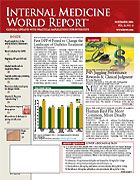Gene Copies Shown to Have Protective Effect Against HIV/AIDS
Gene Copies Shown to Have Protective Effect Against HIV/AIDS
By Rebekah McCallister
People who have copies of a specific gene may be better protected against acquiring HIV infection, and subsequently AIDS, than people without such copies, according to a new study published online in Science (DOI: 101126/science.1101160).
But simply having extra copies of the gene CCL3L1, an HIV-1-supressive chemokine and ligand for the HIV coreceptor CCR5, may not be enough to produce added protection against HIV, lead investigator Enrique Gonzalez, MD, of the Veterans Administration Research Center for AIDS and HIV-1 Infection, South Texas VA Health Care System, and the University of Texas Health Science Center, San Antonio, and colleagues pointed out. “It is not the absolute copy number per se, but rather the gene dose relative to the average copy number in each population that confers HIV/AIDS susceptibility,” they wrote.
This study included 1064 people from 57 populations in whom the number of chemokine gene-containing segmental duplications was determined. In addition, 4308 HIV-1 positive and HIV-1 negative patients from diverse geographical ancestries (eg, Africans, Europeans) were examined to discover if the risk of acquiring HIV, and the rate at which HIV infection progressed, were receptive to CCL3L1 gene-containing segmental duplication.
African populations had more CCL3L1 gene copies than non-Africans. The mean gene copy number of HIV-negative Argentinean children was 2, compare with HIV-negative African- European- and Hispanic-American adults, with 4, 2, and 3 copies each, respectively.
In addition to providing protection against HIV/AIDS infection, the number of copies of the CCL3L1 gene was shown to affect different rates of disease progression. “In the adult HIV-positive cohort, a gene dose lower than the overall cohort median or population-specific median was associated with a dose-dependent increased risk of progressing rapidly to AIDS or death,” the investigators noted.
